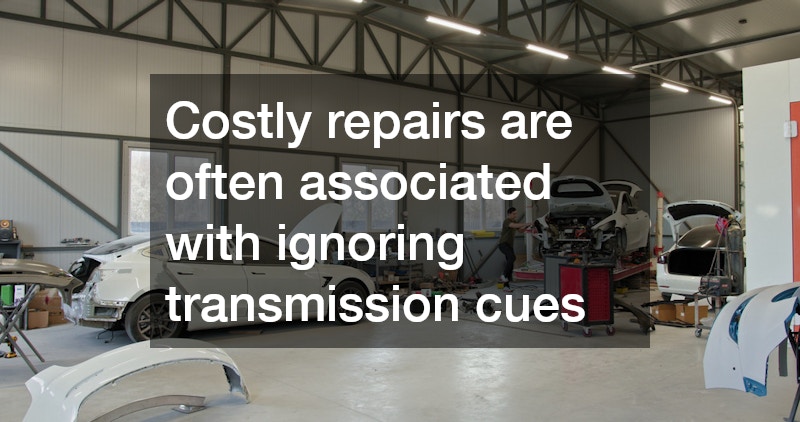Transmission health is crucial in maintaining the overall functionality and reliability of your vehicle. The transmission is responsible for transferring power from the engine to the wheels, ensuring that the vehicle operates smoothly. Ignoring symptoms of transmission issues can lead to severe consequences, such as reduced vehicle performance, unexpected breakdowns, and even total transmission failure.
One of the most significant aspects of vehicle maintenance involves monitoring the transmission system. Regular checks and early detection of anomalies can save you from costly repairs down the line.
Understanding the signs of a failing transmission empowers car owners to take timely action, ensuring longevity and reliability.
Explore the various symptoms indicating a need for transmission repairs and learn the importance of proactive vehicle maintenance. Recognizing these signs early can significantly impact the lifespan of your vehicle and prevent extensive damage.
Warning Signs of a Failing Transmission
Identifying the early warning signs of a failing transmission is critical for preventing further damage. Common problems, such as slipping gears, can manifest in various ways. Drivers might notice that the car hesitates or unexpectedly changes gears while driving, signaling a potential issue with the transmission system.
Another warning sign is delayed engagement. This symptom may occur when shifting from park to drive or reverse, where there is a noticeable lag before the car responds. Such delays can indicate a problem with the transmission fluid or internal components that require attention.
Additionally, strange noises emanating from the transmission can be indicative of pending trouble. Grinding, clunking, or whining sounds can suggest component wear or failure, which should never be ignored. Addressing these symptoms as soon as they arise is essential for maintaining the vehicle’s health.
How to Tell if Your Car Is Having Transmission Issues
Transmission issues can often be diagnosed by looking for specific symptoms. One prevalent indicator is fluid leaks, which may be noticeable as puddles beneath the vehicle. Transmission fluid is typically red or brown, and if you find leaks, it’s essential to investigate further to prevent severe damage.
Warning lights on the dashboard can also point to transmission problems. If the check engine light illuminates or a dedicated transmission warning symbol appears, it’s crucial to have the vehicle inspected immediately. Ignoring these signals could result in a breakdown or costly repairs later on.
Finally, burning smells can be a significant red flag. A burnt odor often signifies overheated transmission fluid or internal friction due to low fluid levels. If you detect such smells, it’s advisable to stop driving the vehicle and seek professional assistance promptly.
The Effects of Ignoring Transmission Symptoms
Neglecting to address transmission symptoms can result in severe long-term damage. The longer you delay, the more likely it is that minor issues will escalate into significant problems. Components may continue to wear out, culminating in a complete transmission failure that may require a costly replacement.
Costly repairs are often associated with ignoring transmission cues. While addressing minor issues like fluid leaks could be a relatively inexpensive fix, prolonged neglect can lead to extensive damage requiring extensive repairs or even a full rebuild of the transmission system.
Moreover, the consequences of driving with a failing transmission can extend beyond repair costs. It can affect your vehicle’s operational safety, potentially leading to accidents. The lack of responsiveness or sudden loss of power can jeopardize your safety and that of other road users.
The Effect of Driving Habits on Transmission Performance
Your driving habits can significantly influence transmission performance and longevity. For instance, aggressive driving, characterized by sudden accelerations and hard braking, can place excessive strain on the transmission system. Such habits can lead to premature wear and tear on the transmission components.
Frequent stop-and-go traffic can also adversely affect transmission health. Constantly engaging and disengaging gears in heavy traffic can create undue stress and overheating, leading to potential transmission issues over time. Being aware of these driving patterns can help individuals adapt their behavior for better vehicle maintenance.
Additionally, towing heavy loads can stress the transmission beyond its capacity. It’s vital to know your vehicle’s towing limits and adhere to these guidelines to ensure the transmission operates effectively. Ignoring these limits can lead to performance degradation and potential failure.
When to Seek Professional Help for Transmission Problems
Knowing when to seek professional help is essential for maintaining your vehicle’s health. If you experience persistent symptoms, such as slipping gears or warning lights, it’s imperative to consult a qualified mechanic without delay. Early intervention can prevent further damage and more expensive repairs.
Moreover, if you notice any unusual noises or smells emanating from the transmission system, don’t hesitate to reach out to a professional. A thorough inspection can diagnose underlying issues, enabling you to address potential problems before they escalate.
In summary, if you observe any combination of warning signs, it’s wise to err on the side of caution and seek expert assistance. Timely service and professional evaluation can keep your vehicle operating smoothly and prevent critical transmission failures.
Being aware of the symptoms that indicate a need for transmission repairs is fundamental for any vehicle owner. From warning signs like slipping gears and delayed engagement to the consequences of neglecting these issues, knowledge is your best defense. Establishing good driving habits also plays a significant role in maintaining your transmission’s health.
Recognizing early indicators and acting swiftly can save you from significant repair costs and extend your vehicle’s lifespan. Regular checks and maintenance are essential to ensure that any potential transmission problems are caught early.
In the arena of vehicle maintenance, being proactive about your transmission can mean the difference between a minor inconvenience and a major catastrophe. Understanding and addressing transmission symptoms can lead to a safer and more reliable driving experience.

